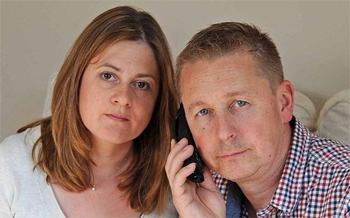These are despicable crimes because they prey on the unsuspecting and vulnerable. The only way that we can ever help potential victims safeguard themselves against these is by sharing information as widely as possible.
NHW Could Be Good For Your Health and Your Pocket
What difference can living in a NHW area make to the desirability of a property? Well quite a lot according to the comparison website Comparethemarket.com who found that 27% of the 2300 people surveyed would prefer to buy a property that was signed up to a NHW scheme.
In a recent Kentish Gazette article, the company’s head of home insurance confirmed their belief that being part of a strong community is high on a purchaser’s agenda when looking to move home, so being part of a NHW area can really make a difference when you are trying to sell. Furthermore living in a close-knit community, and having good neighbours, could have hidden health benefits too, as it may reduce heart attack risks according to American research.
The social support and reduction in stress levels afforded by getting on well with the people in your community could be of benefit, particularly for elderly people who are more likely to suffer health crises, US researchers said. Their findings, based on a four year study of more than 5,000 Americans over the age of 50, found that people who said they trusted and liked their neighbours, felt part of the community, and expected their neighbours to help them if they were in difficulty, seemed less likely to go on to have a heart attack. Levels of social cohesion were rated 1 to 7 based on people’s responses.
Each point on the scale represented a 17 per cent reduction in heart-attack risk, experts at the University of Michigan said. Responding to the new study, Julie Ward, a senior cardiac nurse at the British Heart Foundation, said that many factors beyond poor diet and lack of exercise could increase our risk of heart disease. “This study goes a step further in showing the reverse could be true – that living in a community with good neighbours, that look out for and support each other, could have a positive effect by reducing risk of a heart attack.” (Don’t forget that many home insurers will also offer a discount for members of active NHW schemes!)
Glitch in Phone System Aids ‘Vishing’
If you had an unexpected and suspicious call from someone claiming to be from your bank you would hopefully be on your guard, suspecting it to be a scam designed to trick you into parting with personal data. Once you had put the phone down on the caller though, content that you had divulged no personal details about yourself, you would probably feel relieved and safe, but the sad truth is that you may not be!
Phishing – the online acquisition of confidential information by underhand means is not new. ‘Vishing’ or ‘voice phishing’ is, however, a new and developing trend. In the past 12 months the Financial Ombudsman’s Service has dealt with hundreds of reported cases. The Financial Mail on Sunday recently printed the story of one couple, Jim and Kathy Griffin, who unknowingly handed over more than £42,000 from their bank account to fraudsters as a result of a ‘Vishing’ attack.

Jim, a self-employed electrician, received a call purporting to be from his bank, NatWest, just before a bank holiday weekend. The caller, who spoke with a Scottish accent, said that suspicious activity had been spotted on Jim’s bank account. He reassured him that there was nothing to worry about and that the bank would sort it out. But he suggested that if Jim had any other bank accounts he should get in touch with those banks as soon as possible. Jim let slip that he had an account with Nationwide.
After hanging up from the first caller, he put the phone down then picked it up again to make the call to Nationwide. He heard a dialing tone then phoned the number on the back of his Nationwide bank card. He got through to what sounded like the switchboard at Nationwide, and was offered a number of options before he got through to someone that he could speak to about his account. After giving his name, date of birth, etc. he explained that NatWest had called him and suggested he call Nationwide.
What he didn’t know was that instead of reaching Nationwide, he was still speaking to the earlier caller, thanks to a glitch in the telephone system which allows the call initiator to stay connected on the line for up to two minutes at the end of their call if they don’t replace their handset to complete the termination procedure. This time the fraudster on the end of the line was a woman pretending to be from Nationwide. She said there was a payment for £11,000 due to come out of the account and asked if that was something that Jim had set up, which of course it wasn’t. There was £40,000 in the account because the Griffins were considering the purchase of a buy-to-let property. When the bogus Nationwide operator said she could set up a new account to protect his money from possible fraudulent attack Jim agreed to take her advice and transfer his savings into the new account number that she gave him.
In the heat of the moment he thought nothing of the fact that he was advised to do this in lots of £10,000 – although this should have rung alarm bells as it is the maximum amount that can be transferred without automatically triggering suspicions of money-laundering. By the time the Griffins became suspicious it was the bank holiday weekend and they were unable to do anything about it until the following Tuesday. Kathy called the police, but was greeted by a recorded message. “We tried to talk to the police several times, but they never came back to us,” she said.
Following intervention of their MP the Nationwide eventually agreed to reimburse the lost money, despite the fact that fraudsters were never caught. A spokeswoman for Nationwide said the bank had made a goodwill gesture in the case of the Griffins, but it had been under no obligation to do so. If, whilst reading this, you feel convinced that you wouldn’t have been so easily duped had you been in Jim’s shoes, don’t be, because it’s a safe bet that most of us would take advice from someone that we believed to be a ‘credible professional’ if our savings were thought to be at risk. The phone glitch that allowed this trick to be executed on the Griffins is being rectified.
A BT spokesman said: “We have cut the ‘holding the line open’ time on the lines of about six million customers – about a third of BT’s local exchange network. Alterations on the remaining exchanges are more complicated so these will take longer to change. However, we expect that this will be completed within a year.” It is, of course, an individual’s responsibility to take care not to divulge, knowingly, their bank details to would-be fraudsters, so please take note that – to ensure that you don’t fall into the trap that Jim did, always leave ten minutes between making a call to your bank on the same phone line that you have been contacted on by a suspicious caller. Alternatively use a different phone line, such as a mobile, to make any necessary call to your bank. Read more at: www.thisismoney.co.uk/
Restaurant Owners and Diners Beware!
Restaurant owners and diners are being warned about a new scam targeting restaurant customers in London and the south east. Financial Fraud Action (FFA) UK has urged restaurant goers to stay vigilant when eating out as fraudsters have been posing as bank staff to dupe customers into giving out their bank security details. The scam involves fraudsters calling a restaurant and telling staff that the restaurant payment system is down. They then ask the management to redirect card payments to a new phone number provided by the scammers.

When the restaurant calls the new number, the fraudsters ask to speak to the unsuspecting customer who is asked to verify their identity by giving their bank security details. Once the fraudsters have enough information, they call the customer’s bank and transfer money into their own account using the fraudulently obtained security details. For a full report of this story visit
http://www.which.co.uk
Cheap Chargers Could Prove To Be Expensive
Following accidents, and a fire which claimed five lives, KCC Trading Standards is warning consumers not to buy cheap chargers for phones or laptop computers as they may not be made to the same EU and UK safety standards as genuine products.

Cheap generic and fake chargers can be found online and in market stalls for a fraction of the price paid for genuine ‘named’ brands but these ‘replicas’ can be dangerous as many have been shown to cause fires and injuries. Fake goods are not always easy to identify but if you have bought a cheap charger and think it could be a fake stop using it and report it to Trading Standards, especially if you notice that it has a loose casing or pins.
Always use the correct charger for an appliance and use it safely by following the manufacturer’s instructions and these simple guidelines:
- Avoid leaving electrical products charging over night or unsupervised for long periods of time;
- Don’t charge your electrical product on a flammable surface such as upholstery or carpet;
- Never overload your electrical sockets – the rule should be one plug or one suitable extension lead per outlet; To avoid the possibility of purchasing dangerous goods only buy chargers from a reputable retailer who stocks branded chargers for the product it is designed to charge. If in doubt about the authenticity of a charger contact Trading Standards online at www.kent.gov.uk/tradingstandards or call Citizens Advice consumer service 08454 040506, or 03454 040506 by mobile (Monday – Friday 9am – 5pm)
Be Safe – and check your chargers NOW
Doing Nothing Is Not An Option!
If the ‘correct authorities’ are not informed of fraudsters’ attempts to dupe us then they can’t be expected to help protect us – and that’s worrying considering that, according to consumer watchdog ‘Which’, only 39% of us know how to report scams to the correct authorities. So just in case you’re one of the ‘uninitiated’ here’s a quick guide.
-
Email scams
If you’ve spotted a scam or phishing email, report it to the company or body being mimicked so that they can warn their customers about it by putting notices on their websites. Also notify the internet service provider (ISP) that was used to send you the email. Yahoo can be told at www.abuse@yahoo.com ; Gmail has a ‘Report spam’ button; and Hotmail a ‘Report phishing’ button on their sites.
-
Premium rate phone scams
If you want to complain about or report a premium rate telephone service scam, contact PhonepayPlus, the organisation set up to regulate phone-paid services in the UK, call free on 0800 500 212 from a landline or visit http://www.phonepayplus.org.uk/
-
Reporting scams to trading standards
Trading standards may be able to offer advice. And telling them will help stop other people becoming a victim. Contact Trading Standards on 03454 040506
or at http://www.kent.gov.uk/business/trading-standards/consumer-advice/report-a-problem-to- -
Reporting to Action Fraud
Action Fraud is the UK’s national fraud and crime reporting centre. It provides a central point of contact about fraud and financially motivated internet crime. It offers an online reporting tool at http://www.actionfraud.police.uk/ or you can call and speak to an advisor on 0300 123 2040. After reporting a scam, you’ll get a national crime reference number and the case will be referred to the National Fraud Intelligence Bureau for analysis, by the City of London Police.
-
Reporting a scam to local police
You should consider contacting your local police, on the non-emergency 101 number, to report the scam. This may provide them with useful information to assist in catching the fraudsters.
-
Stop scam mail through the post
The Mailing Preference Service (MPS) allows you to have your name and address removed from mailing lists. To register for the free service, call 0845 703 4599 or visit www.mpsonline.org.uk
Pension Savings at Risk From Fraudsters
Thanks are due to the Coordinator for Woodvale Ave, Chestfield, for noticing this warning published recently in a National Newspaper: Following the Government’s decision to scrap the annuity rules for private pensions (from April 2015), making it possible for individuals to access/draw down their pension freely from the age of 55, there has been a surge in the number of reported scams aimed at those who have money invested in pension schemes.
The fraudsters are setting themselves up in companies with names that are confusingly similar to those of regulated organisations. These firms aim to convince unsuspecting ‘clients’ that it would be beneficial to liberate pension funds for cash or transfer the investments into their own-run schemes. All too often though, once exorbitant fees and charges are subtracted, the pensioner has little or nothing left.
Worse still these bogus salesmen don’t explain that anyone under the age of 55 who cashes in their pension pot has to pay tax on the amount liberated, even if costs charged by unscrupulous dealers gobble up all of the asset! This has left some with no income from their accrued investment and a hefty tax bill to pay, so always consult an independent financial advisor before making a decision.
Useful Contacts
- www.ucanpreventcrime.co.uk/NHW – C&DNHWA
- www.ourwatch.org.uk – National NHW
- www.canterburycsp.org.uk – Community Safety Partnership
- www.firekills.gov.uk – Fire Safety
- www.hoax-slayer.com – Online Protection Advice.
- www.thinkuknow.co.uk – Child Internet Safety.
- www.scambusters.org – Online Protection Advice
- www.ageuk.org.uk – Age
- environmentalhelpdesk@canterbury.serco.com – Fly-Tipping
- www.actionfraud.police.uk – Report Fraud


